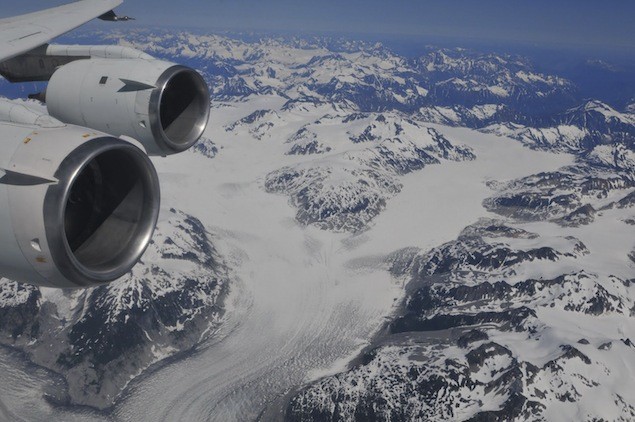A British Columbia glacier is seen from NASA’s DC-8 ASCENDS II flight in this August 2011 handout photo courtesy of the agency. EUTERS/NASA/E.Shaller/ASCENDS II /Handout
 By Environment Correspondent Alister Doyle
By Environment Correspondent Alister Doyle
OSLO, March 7 (Reuters) – Canadian glaciers that are the world’s third biggest store of ice after Antarctica and Greenland seem headed for an irreversible melt that will push up sea levels, scientists said on Thursday.
About 20 percent of the ice in glaciers, on islands such as Ellesmere or Devon off northern Canada, could vanish by the end of the 21st century in a melt that would add 3.5 cm (1.4 inch) to global sea levels, they said.
Governments are trying to understand every likely centimetre of sea level rise caused by global warming to plan how to protect cities from New York to Shanghai or low-lying coasts from Ghana to Bangladesh.
WATCH: Largest Glacier Calving Ever Captured
“We believe that the mass loss is irreversible in the foreseeable future” assuming continued climate change, the scientists, based in the Netherlands and the United States, wrote in the journal Geophysical Research Letters.
Lead author Jan Lenaerts of the University of Utrecht told Reuters that the trend seemed unstoppable because a thaw of white glaciers would expose dark-coloured tundra that would soak up more of the sun’s heat and further accelerate the melt.
A total melt of the glaciers would take several centuries. Climate change is warming the Arctic faster than the global average.
Most past estimates of Canada’s glaciers, based on less precise data of their size and melt rates, pointed to a smaller contribution to sea level rise of perhaps 2 cm this century, Lenaerts said.
The U.N. panel of climate scientists has projected that world sea levels will rise by between 18 and 59 cm this century, or more if a thaw of vast ice sheets in Antarctica or Greenland accelerates.
ALASKA TO PATAGONIA
Canada’s glaciers are little studied and often lumped into the panel’s estimates with ice in Alaska, Patagonia, Russia and Svalbard off north Norway.
“These glaciers are a significant part of the whole equation and of future sea level rise,” said David Vaughan, head of the ice2sea programme for studying global warming based at the British Antarctic Survey in England.
“We can’t afford to ignore them,” he told Reuters. Vaughan was not among the authors of Thursday’s study.
“Most attention goes out to Greenland and Antarctica which is understandable because they are the two largest ice bodies in the world,” said Michiel van den Broeke, a co-author of the study at Utrecht University.
“We want to show that the Canadian ice caps should be included in the calculations,” he said in a statement.
The experts used satellite data of the extent of Canadian glaciers over the past decade to work out a model to project their decline.
The projection of a 20 percent loss of volume was based on a scenario in which world temperatures would rise by 3 degrees Celsius (5.4 F) this century and by 8 Celsius (14.4 F) in the Canadian Arctic, well within most U.N. scenarios. (Editing by Sonya Hepinstall)
(c) 2013 Thomson Reuters, Click For Restrictions

 Join The Club
Join The Club











